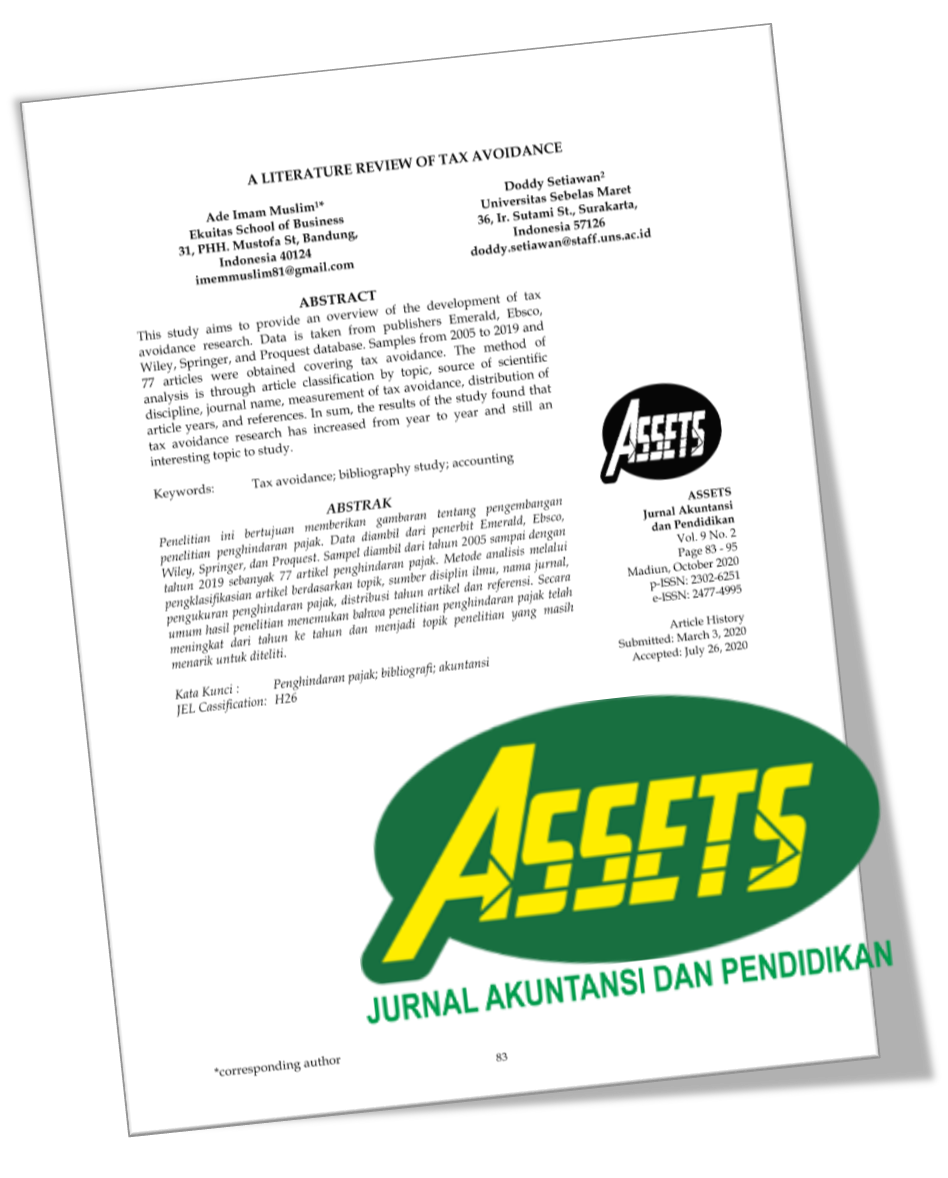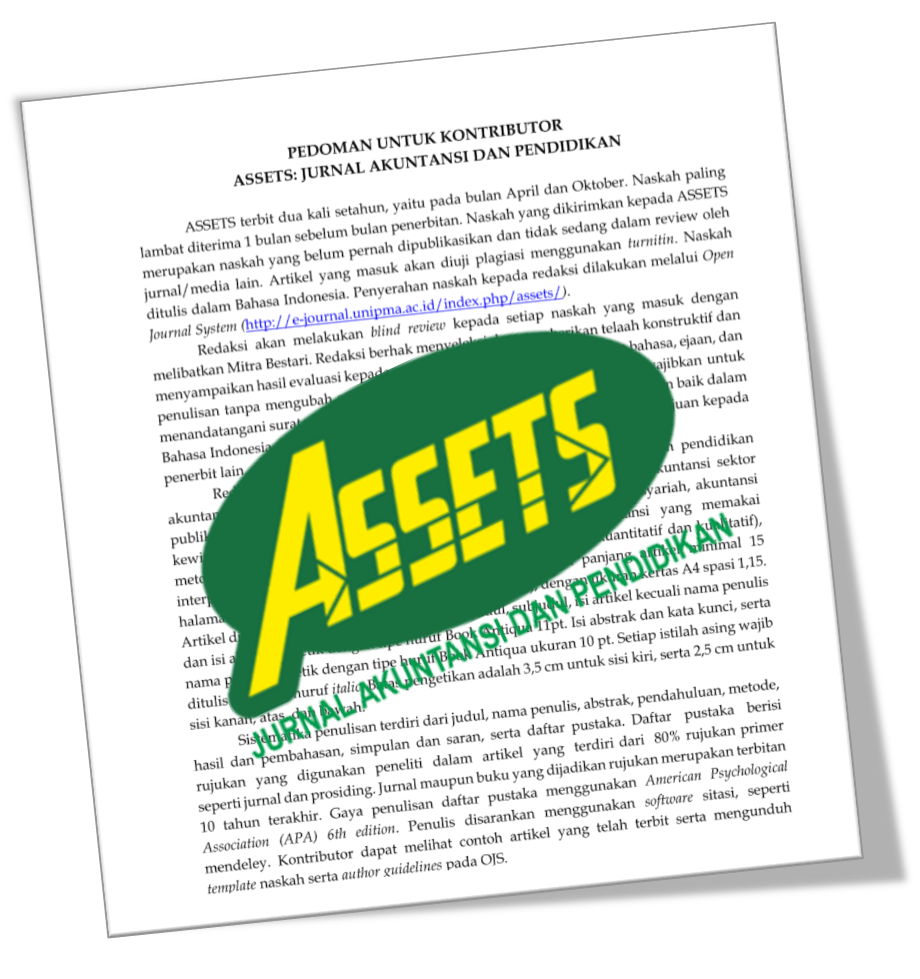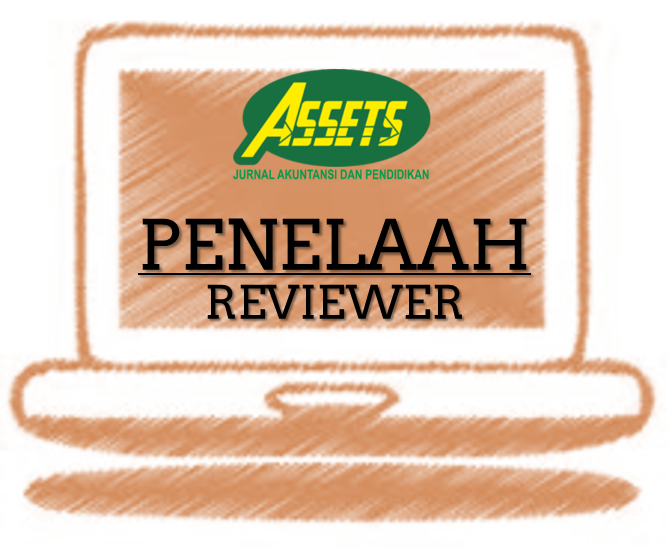IMPROVING THE STUDENTS’ PERFORMANCE FROM THE EXPECTATION AND QUALITY OF LEARNING
DOI:
https://doi.org/10.25273/jap.v10i2.8634Keywords:
Accounting, Undergraduate Student, Gender, Tangerang, Binary Probit Regression, Akuntansi, Mahasiswa Program Sarjana, Jenis Kelamin, Regresi Binary ProbitAbstract
ABSTRACT
This research aims to measure expectations, gender, learning quality, and control variables on the performance of the undergraduate program of Accounting at Tangerang Municipality. The target population is 1,898 students, with 331 of them becoming the sample. The sampling technique was Disproportionate Random Sampling and used a Binary Probit Regression. The distribution of the questionnaires used a Google Form. The results showed that the expectations and quality of learning had a significant effect on improving performance. On the other hand, gender was insignificant. This study's findings contribute to universities always maintaining student expectations and the quality of learning so that graduates have good performance.
ABSTRAK
Penelitian ini bertujuan untuk menguji harapan, gender, kualitas pembelajaran, dan variabel kontrol terhadap kinerja mahasiswa program sarjana S-1 Akuntansi di Perguruan Tinggi Kota Tangerang. Populasi sebanyak 1.898 mahasiswa dan ukuran sampel sebanyak 331 sampel. Teknik sampling adalah disproportionate random sampling dan menggunakan analisis binary probit regression. Distribusi kuesioner menggunakan google form. Hasil penelitian menunjukkan bahwa harapan dan kualitas pembelajaran berpengaruh signifikan terhadap peningkatan kinerja mahasiswa, sebaliknya gender tidak signifikan. Temuan penelitian ini memberikan konstribusi kepada perguruan tinggi untuk selalu menjaga ekspektasi mahasiswa dan mutu pembelajaran agar para lulusannya memiliki kinerja yang baik.
Downloads
References
Aditya, R. M., & Hasibuan, B. A. (2020). Pengaruh Persepsi , Gender dan Tipe Kepribadian Mahasiswa Terhadap Pemilihan Karir Mahasiswa Akuntansi sebagai Akuntan Publik ( Studi Kasus pada Mahasiswa Akuntansi Universitas Darma Persada ). Wacana Ekonomi (Jurnal Ekonomi, Bisnis Dan Akuntansi), 19(1), 43–57. https://doi.org/http:// dx.doi.org/10.22225/we.19.1.1579.43-57
Ahinful, G. S., Tauringana, V., Bansah, E. A., & Essuman, D. (2019). Determinants of academic performance of accounting students in Ghanaian secondary and tertiary education institutions. Accounting Education, 28(6), 553–581. https://doi.org/10.1080/09639284.2019.1679204
Al Mamun, M. A. (2019). Assessing the Gender Effects on Students ’ Accounting Course Performance in Bangladesh : A Bangladesh University of Business & Technology case study. Journal of Business, 04(01), 1–8. https://doi.org/DOI: http://dx.doi.org/10.18533/job.v4i1.112
Alanzi, K. A. (2018). Female accounting students and their academic performance: evidence from Kuwait. Journal of Islamic Accounting and Business Research, 9(2), 662–672. https://doi.org/https://doi.org/10.1108/JIABR-10-2016-0128
Alindra, A. I. (2015). Analisis Pengaruh Budaya Organisasi Terhadap Kinerja Karyawan Depok Sports Center. E-Journal Student UNY, 1(2), 1–10. http://journal.student.uny.ac.id/ojs/index.php/ikora/article/view/2814/2385
Arquero, J. L., Byrne, M., Flood, B., & Gonzalez, J. M. (2009). Motives, expectations, preparedness, and Academic Performance: A study of students of accounting at a Spanish university. Revista de Contabilidad-Spanish Accounting Review, 12(2), 279–299. https://doi.org/10.1016/S1138-4891(09)70009-3
Arumsari, D. (2017). Pengaruh Media Pembelajaran Dan Keterampilan Pengelolaan Kelas Terhadap Prestasi Belajar Siswa SMK Negeri 5 Madiun. Assets: Jurnal Akuntansi Dan Pendidikan, 6(1), 13. https://doi.org/10.25273/jap.v6i1.1290
Bakre, O. M., & Lauwo, S. (2016). Privatisation and accountability in a “crony capitalist†Nigerian state. Critical Perspectives on Accounting, 39(2015), 45–58. https://doi.org/10.1016/j.cpa.2016.01.003
Buri, J. R. (1991). Cross-Method Convergence of Well-Being Measures Further Validation of the Satisfaction LVith Life Scale : Evidence for the Cross-Method Convergence of Well-Being Measures. Journal of Personality Assessment, 57(1), 110–119. https://doi.org/https://doi.org/10.1207/s15327752jpa5701_13
Byrne, M., & Flood, B. (2005). A study of accounting students’ motives, expectations and preparedness for higher education. Journal of Further and Higher Education, 29(2), 111–124. https://doi.org/10.1080/03098770500103176
Byrne, M., & Flood, B. (2008). Examining the relationships among background variables and academic performance of first year accounting students at an Irish University. Journal of Accounting Education, 26(4), 202–212. https://doi.org/10.1016/j.jaccedu.2009.02.001
Dalcı, İ., Araslı, H., Tümer, M., & Baradarani, S. (2013). Factors that influence Iranian students’ decision to choose accounting major. Journal of Accounting in Emerging Economies, 3(2), 145–163. https://doi.org/10.1108/20421161311288866
Daly, A. L., & de Moira, A. P. (2010). Students’ approaches to learning and their performance in the Extended Project pilot. Curriculum Journal, 21(2), 179–200. https://doi.org/10.1080/09585176.2010.480839
Eikner, A. E., & Montondon, L. (2001). Evidence on Factors Associated with Success in Intermediate Accounting I. Accounting Educators’ Journal, 13, 1–17. https://pdfs.semanticscholar.org/61e5/55dee92b223ee5f8ad26079fdbf8d3bc030f.pdf
Fallan, L., & Opstad, L. (2014). Beyond gender performance in accounting: Does personality distinction matter? Accounting Education, 23(4), 343–361. https://doi.org/10.1080/09639284.2014.930693
Fauth, B., Decristan, J., Rieser, S., Klieme, E., & Büttner, G. (2014). Student ratings of teaching quality in primary school: Dimensions and prediction of student outcomes. Learning and Instruction, 29, 1–9. https://doi.org/10.1016/j.learninstruc.2013.07.001
Feldman, G., Chandrashekar, S. P., & Wong, K. F. E. (2016). The freedom to excel: Belief in free will predicts better academic performance. Personality and Individual Differences, 90, 377–383. https://doi.org/10.1016/j.paid.2015.11.043
Ghozali, I. (2016). Aplikasi Analisis Multivariat dengan Prgram IBM SPSS 23 (P. P. Harto (ed.); Ketujuh). Universitas Diponegoro.
Glewwe, P., Hanushek, E., Humpage, S., & Ravina, R. (2011). School Resources and Educational Outcomes in Developing Countries: A Review of the Literature from 1990 to 2010. NBER Working Paper No. 17554. (No. 17554; NBER Working Paper). http://www.nber.org/papers/w17554%0ANATIONAL
Glewwe, P., & Kremer, M. (2005). Schools, Teachers, and Education Outcomes in Developing Countries Paul Glewwe. In E. A. Hanusheknis & F. Welch (Eds.), Second draft of chapter for Handbook on the Economics of Education (p. 943â€1017). Elsevier. https://www.givewell.org/files/DWDA 2009/Interventions/EconEducationHandbook.pdf
Gracia, L., & Jenkins, E. (2002). An exploration of student failure on an undergraduate accounting programme of study. Accounting Education, 11(1), 93–107. https://doi.org/10.1080/09639280210153290
Guney, Y. (2009). Exogenous and endogenous factors influencing students’ performance in undergraduate accounting modules. Accounting Education, 18(1), 51–73. https://doi.org/10.1080/09639280701740142
Hair Jr, J. F., Black, W. C., Babin, B. J., & Anderson, R. E. (2014). Multivariate Data Analysis (Seventh). Pearson Education Ltd.
Helm, C. (2015). Determinants of competence development in accounting in upper secondary education. Empirical Research in Vocational Education and Training, 7(1), 1–36. https://doi.org/10.1186/s40461-015-0022-8
Kistner, S., Rakoczy, K., Otto, B., Dignath-van Ewijk, C., Büttner, G., & Klieme, E. (2010). Promotion of self-regulated learning in classrooms: Investigating frequency, quality, and consequences for student performance. Metacognition and Learning, 5(2), 157–171. https://doi.org/10.1007/s11409-010-9055-3
Kukreja, G., & Al Ali, M. H. (2013). The Determinants of Students’ Performance in Introductory Accounting Courses: Evidence from Kingdom of Bahrain. Journal of Emerging Issues in Economics, Finance and Banking (JEIEFB), 1(3), 183–201. www.globalbizresearch.com
Kunter, M., Klusmann, U., Baumert, J., Richter, D., Voss, T., & Hachfeld, A. (2013). Professional competence of teachers: Effects on instructional quality and student development. Journal of Educational Psychology, 105(3), 805–820. https://doi.org/10.1037/a0032583
Li, H., Liu, J., & Hunter, C. V. (2020). A Meta-Analysis of the Factor Structure of the Classroom Assessment Scoring System (CLASS). Journal of Experimental Education, 88(2), 265–287. https://doi.org/10.1080/00220973.2018.1551184
Litasari, B. A., & Pustikaningsih, A. (2019). Factors affecting accounting learning achievement. Jurnal Pendidikan Akuntansi Indonesia, XVII(2), 113–120. https://journal.uny.ac.id/index.php/jpakun/article/view/22057/11429
Longobardi, C., Pasta, T., Marengo, D., Prino, L. E., & Settanni, M. (2018). Measuring Quality of Classroom Interactions in Italian Primary School: Structural Validity of the CLASS K–3. Journal of Experimental Education, 88(1), 103–122. https://doi.org/10.1080/00220973.2018.1533795
Pane, J., Steiner, E., Baird, M., Hamilton, L., & Pane, J. (2017). How Does Personalized Learning Affect Student Achievement? In Resercah brief (RB-9994-BMGF; Researc Brief). https://doi.org/https://doi.org/10.7249/RB9994
Papageorgiou, E. (2017). Accounting students’ profile versus academic performance: A five-year analysis. South African Journal of Higher Education, 31(3), 209–229. https://doi.org/10.20853/31-3-1064
Papageorgiou, E., & Callaghan, C. W. (2018a). Parental style and gendered student performance in the South African context of accounting studies. Accounting Education, 27(5), 456–478. https://doi.org/10.1080/09639284.2017.1340167
Papageorgiou, E., & Callaghan, C. W. (2018b). Personality and adjustment in South African higher education accounting studies. South African Journal of Accounting Research, 32(2–3), 189–204. https://doi.org/10.1080/10291954.2018.1442649
Papageorgiou, E., & Callaghan, C. W. (2020). Accountancy learning skills and student performance in accounting education: evidence from the South African context. Accounting Education, 29(2), 205–228. https://doi.org/10.1080/09639284.2020.1719426
Parsons, S., Davidowitz, B., & Maughan, P. (2020). Developing professional competence in accounting graduates: An action research study. South African Journal of Accounting Research, 34(2), 161–181. https://doi.org/10.1080/10291954.2020.1727080
Praetorius, A. K., Klieme, E., Herbert, B., & Pinger, P. (2018). Generic dimensions of teaching quality: the German framework of Three Basic Dimensions. ZDM - Mathematics Education, 50(3), 407–426. https://doi.org/10.1007/s11858-018-0918-4
Smith, B., Maguire, W., & Han, H. H. (2018). Generic skills in accounting: perspectives of Chinese postgraduate students. Accounting and Finance, 58(2), 535–559. https://doi.org/10.1111/acfi.12219
Stipek, D., & Chiatovich, T. (2017). The effect of instructional quality on low- and high-performing students. Psychology in the Schools, 54(8), 773–791. https://doi.org/10.1002/pits.22034
Sugiyono. (2017). Metode Penelitian Pendidikan : Pendekatan Kuantitatif, Kualitatif, dan R&D (25th ed.). Alfabeta.
Vroom, V. H. (1964). Work and motivation. Wiley.
Wijaya, A. L., & Amah, N. (2012). Determinan prestasi akademik mahasiswa kelas pengantar bisnis. Jurnal Akuntansi Dan Sistem Informasi, 9(1), 103–113. http://ejurnal.unisri.ac.id/index.php/Akuntansi/article/view/526/459
Winaryati, E. (2018). Penilaian Kompetensi Siswa Abad 21. Seminar Nasional Pendidikan Sains Dan Teknologi, 6–19. https://jurnal.unimus.ac.id/index.php/psn12012010/article/view/4070/3782
Wooldridge, J. M. (2018). Econometrics Introductory (A. Verma, E. Belova, E. Crist, & K. Jean (eds.); Seventh). Cengage.
Yuniarti, T., Widhianningrum, P., & Sulistyowati, N. W. (2020). A Study of Accounting Learning Achievements Using Emotional Intelligence and Learning Behavior. Assets: Jurnal Akuntansi Dan Pendidikan, 9(1), 52–60. https://doi.org/10.25273/jap.v9i1.4179
Downloads
Additional Files
Published
Issue
Section
License
Perjanjian Lisensi dan Hak Cipta
Saat mengirimkan naskah ke jurnal, penulis menyatakan bahwa:
- Mereka diberi wewenang oleh rekan penulisnya untuk masuk ke dalam perjanjian ini.
- Karya yang dimaksud belum pernah diterbitkan secara resmi sebelumnya, kecuali dalam bentuk abstrak atau sebagai bagian dari kuliah, resensi, tesis, atau overlay jurnal yang diterbitkan.
- Karya yang dimaksud tidak sedang dipertimbangkan untuk diterbitkan di tempat lain,
- Publikasi karya yang dimaksud telah disetujui oleh semua penulis dan oleh otoritas yang bertanggung jawab - secara tahu sama tahu atau eksplisit - dari lembaga tempat pekerjaan itu dilakukan.
- Mereka mengamankan hak untuk mereproduksi materi apa pun yang telah diterbitkan atau dilindungi hak cipta di tempat lain.
- Mereka menyetujui lisensi dan perjanjian hak cipta berikut.
Hak Cipta
Penulis yang menerbitkan dengan ASSETS: Jurnal Akuntansi dan Pendidikan menyetujui persyaratan berikut:
- Penulis mempertahankan hak cipta dan memberikan jurnal hak publikasi pertama dengan karya yang secara bersamaan dilisensikan di bawah Lisensi Atribusi Creative Commons (CC BY-SA 4.0) yang memungkinkan orang lain untuk berbagi karya dengan pengakuan kepenulisan karya dan publikasi awal di jurnal ini.
- Penulis dapat masuk ke dalam pengaturan kontrak tambahan yang terpisah untuk distribusi non-eksklusif dari versi jurnal yang diterbitkan dari karya tersebut (misalnya, mempostingnya ke repositori institusional atau menerbitkannya dalam sebuah buku), dengan pengakuan publikasi awalnya di jurnal ini.
- Penulis diizinkan dan didorong untuk memposting karya mereka secara daring (misalnya di repositori institusional atau di situs web mereka) sebelum dan selama proses pengiriman, karena dapat menghasilkan pertukaran yang produktif, serta kutipan lebih awal dan lebih besar dari karya yang diterbitkan.
License and Copyright Agreement
In submitting the manuscript to the journal, the authors certify that:
- Their co-authors authorize them to enter into these arrangements.
- The work described has not been formally published before, except as an abstract or part of a published lecture, review, thesis, or overlay journal.
- That it is not under consideration for publication elsewhere,
- That its publication has been approved by all the author(s) and by the responsible authorities – tacitly or explicitly – of the institutes where the work has been carried out.
- They secure the right to reproduce any material already published or copyrighted elsewhere.
- They agree to the following license and copyright agreement.
Copyright
Authors who publish with ASSETS: Jurnal Akuntansi dan Pendidikan agree to the following terms:
- Authors retain copyright and grant the journal right of first publication with the work simultaneously licensed under a Creative Commons Attribution License (CC BY-SA 4.0) that allows others to share the work with an acknowledgment of the work's authorship and initial publication in this journal.
- Authors can enter into separate, additional contractual arrangements for the non-exclusive distribution of the journal's published version of the work (e.g., post it to an institutional repository or publish it in a book), with an acknowledgment of its initial publication in this journal.
- Authors are permitted and encouraged to post their work online (e.g., in institutional repositories or on their website) before and during submission, as it can lead to productive exchanges and earlier and more extraordinary citations of published work.

ASSETS: Jurnal Akuntansi dan Pendidikan is licensed under a Creative Commons Attribution-ShareAlike 4.0 International License.










